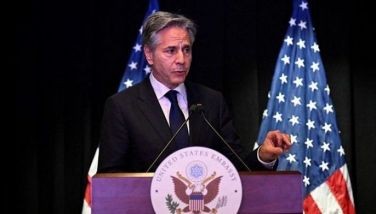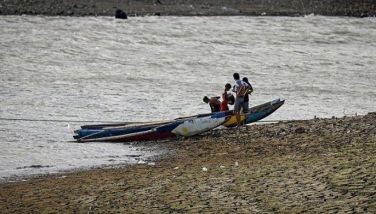Philippines asks Vietnam to work for unified, cohesive approach on sea dispute
HANOI – President Duterte enjoined Vietnam President Tran Dai Quang to work for a “cohesive” and “unified” approach to resolving conflict over territories in the South China Sea during their bilateral talks here yesterday.
Duterte also encouraged countries belonging to the Association of Southeast Asian Nations (ASEAN) to work within a peace framework in resolving the maritime issue.
In his opening statement before the bilateral talks, Duterte expressed solidarity with Vietnam, which is itself embroiled in the South China Sea dispute.
The President stressed any initiative to resolve the maritime row, whether “bilateral, unilateral or whatever arrangements,” should come from ASEAN member-states, “especially those with stakes” in the issue.
Duterte has vowed to chart an independent foreign policy and has even talked about crossing the Rubicon in his dealings with the US. He said he is ready to enhance trade and commerce with Russia and China, both potential US adversaries.
China’s nine-dash line claim covers almost the entire South China and extends to the coastlines of smaller Asian countries. It has been reclaiming lands in disputed waters, apparently to further strengthen its hold on areas it claims as its own.
“I do not believe that any other country would do any talking for us,” he said, adding the Philippines and Vietnam “have not been in regular contact with each other.”
He added that while “we do not talk contradictory,” it “would be good if there is a cohesive and unified stand for us all.”
The President’s statement was cut as television crews were asked to leave after the video and photo opportunity.
In a press briefing, Foreign Affairs Secretary Perfecto Yasay Jr. explained there is no conflict between the Philippines and Vietnam over territories in disputed waters.
Both countries reaffirmed their commitment to respect the rule of law as embodied in the 1982 United Nations Convention on the Law of the Sea (UNCLOS).
“The Vietnamese and Philippine position on the handling of the dispute on the South China Sea are convergent. There is no conflict. We have agreed to – like the other ASEAN members, of which the Philippines and Vietnam, are members – to respect the rule of law, international law and the 1982 UNCLOS,” he said.
Peaceful settlement
Yasay said both countries have agreed to go for a peaceful settlement of the disputes even after the UN arbitral tribunal recently ruled in favor of the Philippines by invalidating China’s expansive maritime claims.
“And to ensure that we pursue the legal and diplomatic processes in the peaceful settlement of disputes, we should have more restraint in our deportment, in our actions to make sure that we do not do any provocative acts that would undermine the peaceful settlement of these disputes,” the foreign affairs chief said.
He said the two countries have also reaffirmed their commitment to follow the Declaration of Conduct signed by all ASEAN members in 2002 and work vigorously for a binding code of conduct.
“And we together agreed to fully implement the Declaration of Conduct that was already approved and signed by all ASEAN members in 2002 and to proceed on a fast-track basis with the coming out of a code of conduct,” Yasay added.
“So very clearly, the position of Vietnam and China and the Philippines is solidly in line with the ASEAN’s position on the matter,” he pointed out.
Yasay noted the Philippines cannot be partial regarding the matter, especially in the wake of the UN tribunal ruling.
“Having said that, we also agreed that insofar as the merits of our claims, our concerns, we cannot be involved or be partial about it,” he said.
“Even the rest of the international community that had – one way or the other – supported Vietnam, supported us or supported China have always just simply supported our adherence to the rule of law, of which China and the rest of the international community that have expressed support for that are signatories, including signatories to the UNCLOS,” Yasay said.
Vietnam, China and Taiwan are fighting over waters west of the Spratly Islands.
Also involved in the maritime row aside from Vietnam and the Philippines are China, Taiwan, Brunei, Malaysia.
Bilateral talks
Ahead of his visit to China, Duterte encouraged his Vietnamese counterpart to have bilateral talks with Beijing over the South China Sea issue.
Yasay said the President stressed to Tran the importance of bilateral talks with Beijing.
“Bilateral engagements with China are necessary with this respect because the arbitral tribunal’s decision has no enforcement capability or mechanisms on its own,” Yasay said.
Duterte also stressed during the meeting that the enforcement and implementation of the arbitral tribunal’s decision would have to be pursued and made by the claimants themselves based on acceptable terms.
The President, according to Yasay, also stressed that “at one point in time, we will begin bilateral talks with China insofar as coming up with a solution for the peaceful settlement of this dispute in the South China Sea.”
He said the President emphasized “it must be within the context of the decision of the arbitral tribunal.”
“Incidentally, we also said that the decision of the arbitral tribunal is our contribution to the jurisprudence insofar as maritime law and the interpretation of the provisions of the UNCLOS is concerned,” the DFA chief pointed out.
- Latest
- Trending


























